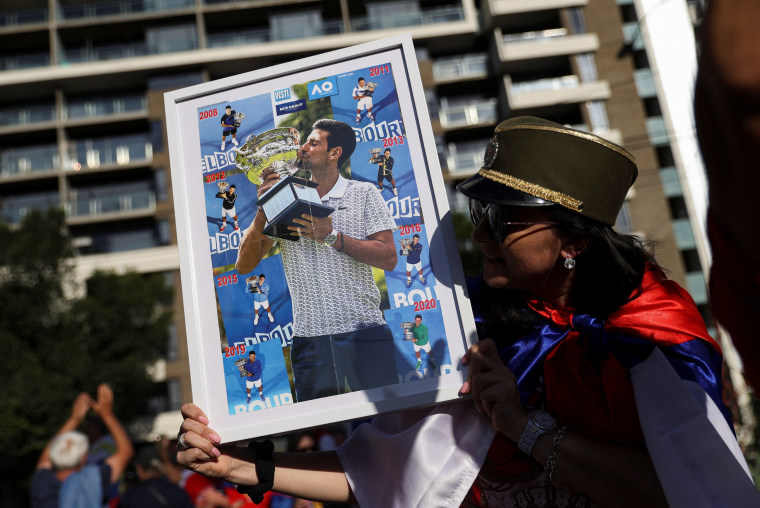A judge rejected Australian authorities’ request to delay tennis star Novak Djokovic’s court hearing until Wednesday as he prepares to challenge a decision to cancel his visa.
As a result, government lawyers will have defend their decision to bar entry to Djokovic, the world’s No. 1 men’s player, over his Covid-19 vaccination status on Monday as planned.
Federal Circuit and Family Judge Anthony Kelly did not say in a ruling dated Saturday why authorities had sought to delay the hearing until five days before Australian Open, at which Djokovic hopes to win his 21st Grand Slam title.
His participation, a week before the season’s first major tennis tournament is set to begin, is a major doubt. Instead of training, he has been confined to a hotel used to accommodate asylum-seekers.
In an email Sunday, Australia's Home Affairs Department said it had no comment about the ruling because “the matter was before the courts.”
Download the NBC News app for breaking news and politics
The furor began when Djokovic, 34, announced Tuesday on Instagram that he had been granted exemption from Covid-19 vaccination to fly to Australia to take part in the tournament.
While he was in the air, questions were raised about exactly how and why Djokovic was granted the exemption as the epidemic worsens in Australia.
The country's Covid-19 rules stipulate that incoming travelers must have had two shots of an approved vaccine or must have exemptions with genuine medical reasons to avoid quarantine. All players, staff members, officials and fans also need to be fully vaccinated to enter the tournament.
Upon landing in Melbourne on Wednesday, Djokovic was denied entry after his visa was canceled because he had failed to provide appropriate evidence to meet entry requirements.
Djokovic has declined to reveal his vaccination status.
His lawyers argued in court papers filed Saturday that he had been granted an exemption because he had contracted — and recovered from — the virus last month.
However, the claim has been subjected to more scrutiny after photos on social media showed Djokovic attending public events without a mask on the day his lawyers say he tested positive for Covid-19 — the day after the diagnosis.
It is not known whether Djokovic was aware that he had tested positive when he attended the events.
His representatives have been asked for comment.
Government lawyers said in a court filing that authorities had not assured Djokovic that they would accept a medical exemption he said he had to enter the country without having been vaccinated.
While he has awaited his hearing, Djokovic spent four days in immigration detention in a Melbourne hotel used to house refugees and asylum-seekers. Some of his Australian fans, many draped in Serbian flags and wearing “Novak” T-shirts, have protested outside the hotel in his support.

His family has accused the Australian government of holding him as a “prisoner.” Authorities rejected the claims, saying Djokovic was free to leave Australia at any time.
Djokovic thanked his supporters in an Instagram post Friday as he celebrated Orthodox Christmas in detention. “I can feel it and it is greatly appreciated,” he said.
Other players who were granted medical exemptions by Australian authorities have also been scrutinized and swept up in the drama.
Renata Voracova, 38, a Czech doubles player, was detained in the same hotel over a vaccination dispute before she left Australia on Saturday, The Associated Press reported.
